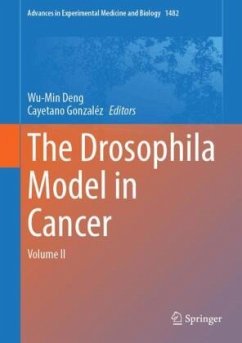
The Systemic Effects of Advanced Cancer
A Textbook on Cancer-Associated Cachexia
Herausgegeben: Acharyya, Swarnali

PAYBACK Punkte
38 °P sammeln!
This textbook discusses the systemic consequences of cancer, covering a range of topics from tumor-promoting systemic effects to the development of cachexia, as summarized in the introductory chapter 1.Part I of this textbook focuses on tumor-promoting systemic effects and begins with a chapter on how tumor-derived extracellular vesicles and particles lay the foundation for future metastases (Chapter 2). Chapter 3 discusses how metastatic cells that have colonized the bone impact the local bone microenvironment, neighboring muscles, and host physiology. Chapter 4 summarizes the available strat...
This textbook discusses the systemic consequences of cancer, covering a range of topics from tumor-promoting systemic effects to the development of cachexia, as summarized in the introductory chapter 1.
Part I of this textbook focuses on tumor-promoting systemic effects and begins with a chapter on how tumor-derived extracellular vesicles and particles lay the foundation for future metastases (Chapter 2). Chapter 3 discusses how metastatic cells that have colonized the bone impact the local bone microenvironment, neighboring muscles, and host physiology. Chapter 4 summarizes the available strategies for targeting metastatic cancer and emphasizes the need to incorporate a systemic view of the disease. Following this overview of the systemic effects of cancer progression, Part II of the textbook discusses cancer-induced cachexia, a debilitating systemic effect of advanced cancer. Chapters 5-7 examine the key signaling pathways (interleukin-6/GP130, NF-kB, and muscle proteolysis) that drive the development of cancer cachexia. Chapters 8 and 9 in Part III of this textbook explore how toxicities from anti-cancer therapy are associated with the onset of cachexia in cancer patients, and provide insight into potential approaches to simultaneously target both cancer and cachexia. Chapters 10 and 11 (Part IV) conclude this textbook by outlining promising approaches for the diagnosis and treatment of cachexia as well as strategies to prevent the development of cachexia through exercise.
An understanding of the systemic effects of cancer is essential for the design of effective anti-cancer and anti-cachexia treatment strategies. As such, this textbook provides key information for both students and scientists engaged in cancer research and oncology.
Part I of this textbook focuses on tumor-promoting systemic effects and begins with a chapter on how tumor-derived extracellular vesicles and particles lay the foundation for future metastases (Chapter 2). Chapter 3 discusses how metastatic cells that have colonized the bone impact the local bone microenvironment, neighboring muscles, and host physiology. Chapter 4 summarizes the available strategies for targeting metastatic cancer and emphasizes the need to incorporate a systemic view of the disease. Following this overview of the systemic effects of cancer progression, Part II of the textbook discusses cancer-induced cachexia, a debilitating systemic effect of advanced cancer. Chapters 5-7 examine the key signaling pathways (interleukin-6/GP130, NF-kB, and muscle proteolysis) that drive the development of cancer cachexia. Chapters 8 and 9 in Part III of this textbook explore how toxicities from anti-cancer therapy are associated with the onset of cachexia in cancer patients, and provide insight into potential approaches to simultaneously target both cancer and cachexia. Chapters 10 and 11 (Part IV) conclude this textbook by outlining promising approaches for the diagnosis and treatment of cachexia as well as strategies to prevent the development of cachexia through exercise.
An understanding of the systemic effects of cancer is essential for the design of effective anti-cancer and anti-cachexia treatment strategies. As such, this textbook provides key information for both students and scientists engaged in cancer research and oncology.












